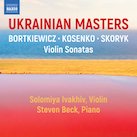

Solomiya Ivakhiv: Ukrainian Masters: Violin Sonatas: Bortkiewicz, Kosenko, Skoryk
Naxos
During a war, musicians don't generally don battle gear and head to the front lines to fight. But as the actions taken by Ukrainian-American violinist Solomiya Ivakhiv show, they can do more than sit idly by and bear witness to the carnage. On her new release, the esteemed violinist honours her home country by presenting works by three seminal Ukrainian composers. It's not the first time she's promoted the music of her homeland, as illustrated by her earlier albums, Ukraine - Journey to Freedom (2016) and Poems and Rhapsodies (2022). She has also, since 2010, been Artistic Director of the Music at the Institute (MATI) Concert Series in New York City and through that role exposes audiences to the classical music of her native country. Three years ago, Ivakhiv also received its highest cultural honour, Honoured (Merited) Artist of Ukraine.
Accompanied by renowned pianist (and a formidable solo artist in his own right) Steven Beck, the violinist presents sonatas spanning 1922 to 1991, Sergei Bortkiewicz's the earliest and Myroslav Skoryk's the latest; early too is Viktor Kosenko's, which followed Bortkiewicz's by five years. Though she was aware of Kosenko's piano music growing up, Ivakhiv only discovered his sonata after moving to the United States when she was studying at the Curtis Institute of Music. Skoryk, on the other hand, she knew personally and even played for him before his 2020 passing.
As noted by Richard Whitehouse in liner notes, the composers' lives were profoundly affected by political developments of one kind or another. Kosenko studied and gave concerts in Russia, but eventual conflicts with the Stalin regime prompted him to relocate to Kyiv, where he taught at the Mykola Lysenko Music and Drama Institute and became a professor in 1932. As a young boy, the Lviv-born Skoryk and his family were deported to Siberia; upon their 1955 return, he studied at the Lviv Conservatoire and later the Moscow Conservatoire before joining the music faculties of the conservatoire in Lviv and then Kyiv. According to the press release, Bortkiewicz's music “was banned in the Soviet Union as he was a refugee and fled Ukraine via Istanbul, Belgrade, Sofia, Serbia and Vienna when Russians occupied Eastern Ukraine.”
Enhancing the value of the release is the world premiere recording of Kosenko's Violin Sonata in A minor, Op. 18, appearing for the first time on record almost a century after its creation. Formally unusual in featuring two movements only, the sonata is nevertheless striking and deserving of inclusion. Asserting itself with authority, the mercurial “Allegro” advances through multiple episodes, some ferocious and others more restrained. Ivakhiv's attack is assured as she navigates through rapidly changing terrain and engages in passionate dialogue with Beck. There's volatility but also playfulness and sweetly romantic flourishes. Opening languidly, the “Andantino semplice” beguiles with its sunny disposition and lilting flow; what distinguishes the presentation most, however, is the inspired and emotionally expansive reading the recital partners give to it.
Written almost three decades after its predecessor, Skoryk's second violin sonata packs three compact movements into fifteen minutes, its first part, “The Word: Moderato con moto,” a restless, dramatic exploration that advances with purposeful deliberation through chromatically knotty realms. Perpetuating the brooding, mysterious tone of the opening movement, “Aria: Andante con moto” sees the violinist gliding confidently across a plodding piano base, the material at times folk-inflected and angst-ridden and its driving theme mournful. Hugely contrasting by comparison, the “Burlesque: Vivo” leaps into action at high velocity, with the musicians somehow managing to keep the roller-coaster from flying off the rails. Folk and jazz flavourings surface here too and add to the devilry.
At twenty-five minutes, Bortkiewicz's Violin Sonata in G minor, Op. 26 unfolds at a less frenetic pace than Skoryk's. An eloquent, yearning theme bolsters the impact of the opening “Sostenuto – Allegro drammatico,” but it's as arresting for light-speed finger-work and impish sardonicism by the musicians. The pretty “Andante” likewise benefits from the inclusion of an affectingly tender theme and romantic to-and-fro. Concluding the work on a high is the “Allegro vivace e con brio,” which sparkles with radiant folk melodies and joyful affirmation. Of course a key part of the recording's appeal has simply to do with the pleasure of hearing Ivakhiv and Beck perform. Her unerring command is evident in every gesture, her articulation crisp and precise and handling of rhythm and expression immaculate. A splendid partner, he's with her at every moment, be it playing in unison or in counterpoint. Let's hope more collaborations between the two will follow.April 2024